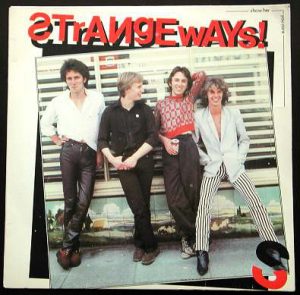
For 30 years now, Carl Malamud’s been waging a mission to make public information free and accessible.
It’s a campaign that’s landed the internet pioneer in hot water and frequent court battles with governments and officials in his native US and overseas. It’s also attracted the attention of the FBI.
Georgia’s even accused him of employing a ”strategy of terrorism” over his efforts to force US states to publish their own laws freely on the net.
Now with the aid of alternative musician and videographer Barry Snaith – aka The Inconsistent Jukebox and longterm collaborator Martin Lucas, his tireless activism has been distilled into a cinematic five-minute musical composition.
Matt Catchpole caught up with TIJ’s Snaith – once of Wakefield punk rockers Strangeways – to find out how the unusual project came about.

“The music was actually originally intended for an ad, which is in production as we speak, but it’s ended up becoming a single too. Free of course – how could it not be?” Snaith says of the birth of Open Access Ninja by The A2K.
Snaith was introduced to Malamud by Lucas and the trio became fast friends.
Malamud’s fearlessness and determination to bring what should be public information out of the protection of copyright and making it freely available to all via the internet proved hugely inspiring to Snaith.
“Carl’s a tour de force! Brewster Kahle, founder of The Internet Archive, said about him: ‘Heroes for me are ones who take risks in pursuit of something that they think is good. He’s in that category’. I agree.
“Carl’s on a one-man mission to achieve something worthwhile for people, for something that should be free, and at his own expense and risk. That’s admirable.”
One of the first technologists to realise the potential of the internet, Malamud authored several books on the subject and launched his own start up before becoming consumed by Open Access activism.
Since forming the not-for-profit Public.Resource.Org he’s become the scourge of government of all levels – both in the US and internationally.
Any organisation which seeks to keep secret, shroud in bureaucracy, or charge fees for what Malamud believes should be public information is likely to find itself on his hit list.
Notable achievements include digitising 568 government films for the Internet Archive and YouTube, persuading Oregon not to assert copyright over its legislative statutes and challenging California’s copyright claims by publishing its criminal, building and plumbing codes online.
Outside the US, he’s taken on the governments of the UK and India over free access to regulations and standards documents.
Not bad for someone who jokes that he “majored in beer” at the University of Indiana.
Allied to his considerable intellect and resourcefulness, Malamud deploys a wicked sense of humour to get his point across.
For example the logo, or seal for Public.Resouce.Org, is literally a cartoon seal – the mammal – complete with whiskers.

Similarly he describes himself as a “usually civil servant” on Twitter.
It’s a way of providing a new perspective to what might otherwise appear a dry subject.
Wired calls Malamud ‘The internet’s own instigator’ employing wit, gimmickry, lobbying and the power of social media to expose what the magazine calls ‘the fine print of the citizenry’s everyday existence’ – stuff like fire prevention codes and baby seat safety regulations.
While it’s not exactly chucking TV sets out of hotel windows, Malamud’s work has a rebellious quality that appeals to Snaith’s punk sensibility.
“I think what he does IS rock ’n’ roll and he has King Kong’s balls (figuratively speaking of course, I don’t know him THAT well),” Snaith jokes.
“Access to knowledge is a human right and he’s unafraid to take on governments for that right.”
Snaith says Malamud’s input gave real energy to the collaboration and he receives a full co-writing credit on the single.
“Carl was, unsurprisingly, the driving force behind the project but Marty and I had free creative rein,” he explains.

Lucas is a longstanding friend of Malamud’s, working with him on several groundbreaking projects.
He was a producer and editor on The Internet Multicasting Service – the first internet talk radio show – which Malamud launched in 1993 and also produced his Geek of the Week internet audio show – effectively a podcast, long before the term was coined.
Lucas was thus well placed to condense Malamud’s renegade spirit and activism into song.
“Marty’s role was to be a kind of cross between a Raymond Chandler movie-narrator and Lou Reed’s half sung/half spoken drawl,” Snaith explains.
“He skilfully shaped many of Carl’s epithets and beliefs into something mysterious to perfectly fit the bill.”
Using the soundtracks of John Barry – whose credits include several Bond movies, The Ipcress File and Bullitt – as his template Snaith then worked up an evocative, electronic backdrop to Lucas’ abstract lyrics.
“Marty brought in vocalist Tad Robinson to add his rasping New York drawl at the end and give some soul to what could be a cold subject,” adds Snaith, and Open Access Ninja was unleashed.
Here’s Snaith’s teaser video for the single:
The music sounds not unlike David Bowie’s work on final album Blackstar and Snaith says there will be more to come from A2K (Access To Knowledge).
“Carl’s a smart, witty, friendly guy who exudes positivity and I love that. It’s infectious, like a reverse Coronavirus,” Snaith jokes. “We all hit it off so well.”
Snaith is no stranger to the pages of An Ideal For Living through his work with TIJ and as one half of the duo m1nk with Erika Bach.
He got his first sniff of fame in Strangeways during the early days of punk, the Yorkshire band signing to the same label as Chrissie Hynde of The Pretenders and Johnny Thunders of Heartbreakers and New York Dolls fame.
“They were fantastic times. Probably the best musical period to grow up,” Snaith remembers. “Punk Rock was a revolution. Iconoclastic, vibrant, aggressive and exciting.”
Strangeways backed Hynde on a French language version of The Troggs’ Wild Thing before she formed The Pretenders.
After Hynde hooked up with James Honeyman-Scott, Pete Farndon and Martin Chambers Strangeways gave them their live debut by taking them on tour as support.
They even helped her with the title for an early hit.
“Brass In Pocket is a Yorkshire phrase uttered by our singer,“ Snaith explains. “There’s a story about it all over the internet but the one that you read is apocryphal.
“The ACTUAL story is that Chrissie heard it said in a post-gig dressing room in Wakefield, our home town.
“’Hey whose are these strides?’ she said. ’They’re mine if there’s brass int’ pocket’ came the reply.”
It wasn’t long before the tables were turned and Strangeways were opening for the Pretenders.
“We knew she was a star from the moment we met,” Snaith remembers. “She was a woman with the determination and drive to get what she wanted. I have total respect for her as an artist, songwriter and person.”
Strangeways would often bump into Thunders in the offices of Real Records,
“He was usually talking to producer Steve Lillywhite on the phone (or maybe it was his dealer), smoking a spliff and always looking so dapper.
“He was a really friendly guy. We were around when he recorded his great So Alone album and I remember how stunned everyone was at Steve Marriott’s guest vocal.”
Strangeways played the So Alone launch party gig at London’s Speakeasy for Thunders’ solo album – where he was backed by Walter Lure, Paul Cook, Steve Jones and Paul Gray.

“Lots of musicians hung around The Speakeasy at that time – the place to go and be seen. Gary Holton (Heavy Metal Kids /Wayne in Auf Weidersehen Pet) was at the gig, totally off his tits, trying to score drugs from us, along with Ari Up from The Slits and Peter Perrett from The Only Ones.
“The scene at that time was buzzing – we were at Billy Idol’s birthday party, spotted Keith Moon in Wardour Street getting out of a Bentley in full horse-riding gear and watched the fledgling Adam and the Ants rehearsing at The Marquee.”
Strangeways also played several gigs with The Ramones and drummer Tommy (Erdelyi) produced their second single – giving them an up close view of the inter-band dynamics.
“It was like Beavis and Butthead,” Snaith laughs. “Their manager at that time was Linda Stein, wife of Seymour (head of Sire Records).
“She bullied ‘da brudders’ like she was their mum. Hilarious to watch. They did as they were told too.”
Strangeways were to have their own run in with Seymour when he took exception to their light-fingered antics.
“He booked us a residency in Paris and we repaid him by nicking loads of albums from his Sire Records offices and selling them down Camden Market because we were always skint.”
No lesser producer than John Leckie (XTC, Radiohead, The Stone Roses) was hired to helm Strangeways’ debut album at Abbey Road studios.
But the band blotted their copybook once again when Beatles’ producer George Martin popped in to say hello.

“Unfortunately, when he put his head around the door, we were all on our backs trying to touch our toes on the ground behind our heads. The legendary George was greeted by the sight of a pair of hairy little testicles poking through a hole in one of the band’s trousers.”
Strangeways were given lots of opportunities, Snaith admits, “but we just didn’t take it seriously enough” and eventually the band imploded.
Not that he has too many regrets.
“The ’70s was such a diverse and ground breaking decade. Peace, love,drugs and sexual freedom had exploded at the end of the ’60s and in the next 10 yeara we had Rock Prog-Rock, Glam Rock, Pop, Disco, Punk, New Wave and the beginnings of rap.
All of that shaped indie alternative music,electronica, dance and hip-hop as we know them today.”
More recently Snaith has worked as a videographer, solo musician and producer collaborating with artists all over the world
“I work a lot in conjunction with VR digital artists, Andy Campbell and Judi Alston and we have a few projects under our belts and in the pipeline,” he explains.
“Rather than music being a soundtrack for art, we want the two to be mutual. Art and music. It’s much more of a visual world now and I love inhabiting that virtual space.”
Influenced by artists such as Captain Beefheart, Throbbing Gristle, The Cocteau Twins and David Lynch, he’s currently working on the follow up to TIJ’s Gig Economy along with soundrack work for apps and more VR digital video.
“Like Carl Malamud, I’m not one to stand still,” he says.
In a world often dominated by stories of the dark side of the net, it’s heartening to hear of a collaboration between two renegades, who harness technology in such diverse but vital and creative ways.
It will be interesting to see what they come up with next.
- For more about Carl Malamud visit Public.Resource.Org or check out his Twitter page
- For more abour Barry Snaith and TIJ visit his Facebook page, Soundcloud link or Seja Records